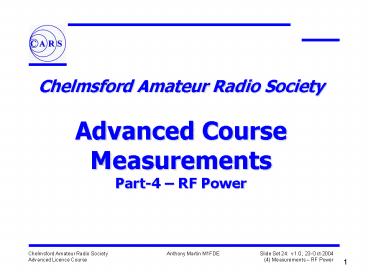Chelmsford Amateur Radio Society Advanced Course Measurements Part-4 - PowerPoint PPT Presentation
Title:
Chelmsford Amateur Radio Society Advanced Course Measurements Part-4
Description:
Some Oscilloscopes have 50 Ohm input setting. It will not handle much power. ... 50 Ohm centre conductor. R must match coupling lines ... – PowerPoint PPT presentation
Number of Views:86
Avg rating:3.0/5.0
Title: Chelmsford Amateur Radio Society Advanced Course Measurements Part-4
1
Chelmsford Amateur Radio Society Advanced
CourseMeasurementsPart-4 RF Power
2
RF Power Meters
- RF Power can be measured using
- Thermal instruments
- AC ammeters and a load
- AC voltmeters and a load
- In-line directional-coupler instruments
- Oscilloscopes
- The range of power meters can be extended using
attenuators - Make sure components are adequately rated for the
power - If mismatches are introduced, your instrument
will be inaccurate
3
Measuring across a Load
- Some Oscilloscopes have 50 Ohm input setting.
- It will not handle much power.
- Use an external attenuator.
- If there is no 50 Ohm setting, use a 50 Ohm
terminator and a T-piece - 101 probes can be used if the voltage on the
load is high - But accuracy of 101 probes is poor at high
frequency
4
Measuring RF Amplitude
- For lower frequencies, pk-pk volts can be
measured directly across a load R. - Depends how fast your scope is.
- The amplitude is half the pk-pk value
- The RMS voltage is amplitude x 0.707
- Calculate power P V 2 / R
- Transmitters must be operated in continuous CW
mode or with an SSB tone
5
Dummy Load with Detector
- Resistors present a 50 Ohm load
- Divides voltage by 5
- Diode detects peak of RF
- RMS volts can be calculated
- Power in 50 Ohm load can be calculated
6
SWR Measurement
- SWR can be determined from detectors of forward
and reverse power. - SWR can be determined by comparing samples of
voltage and current. - SWR is displayed using meters with calibrated
(non-linear) scales
7
Coupled Lines SWR Meter
- 50 Ohm centre conductor
- R must match coupling lines
- Mechanical construction, but effective at UHF and
above - Maximum coupling with lines ¼ wave long
8
Current Transformer SWR
- Typical arrangement of many in-line SWR meters
9
Measuring PEP Amplitude
- This is the two-tone-test
- PEP is Peak Envelope Power
- The amplitude is half the pk-pk value
- The RMS voltage is amplitude x 0.707
- Calculate power P V 2 / R
- Reduced stress on Tx designed for SSB voice































